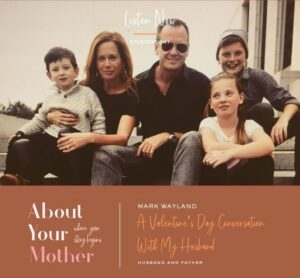Is there hope in loss? Yes. Absolutely. My conversation with copywriter turned novelist JJ Elliot is an exploration of her experience losing her mom to suicide, then having that open doors to her helping others.
Subconsciously, the loss of her mom led to her novel about a group of women who lose a friend by her own hand. Those friends take that loss to celebrate their own lives. JJ’s goal in writing her book was to get people to laugh and cry at the same time, which is exactly what I did when I talked to JJ.
How JJ’s Mother’s Suicide Shaped Her Novel
At 17 years old, JJ lost her mom to suicide. The experience had a profound impact on her life and on her recent novel, There Are No Rules For This. JJ’s mom was full of life and joy when she was well, which taught JJ a great deal about the suicidal mindset. She also learned more by reading poetry by Anne Sexton and Sylvia Plath, as well as working the suicidal hotlines in college.
Understanding more about suicide was cathartic for JJ, but she never planned to write a fictional story about it. She was working as a copywriter in advertising when the idea for the story came to her in a flash, and she knew she needed to write the book.
JJ was intimidated to write a story with suicide in it because she was afraid that she wouldn’t get it right. However, once she started writing, her characters quickly became alive to her and led the way.
How to Talk Someone Through a Suicidal Crisis
JJ spent time in college working at suicide hotlines in LA, and she learned that talking someone through a crisis is simpler than you’d expect. You start by asking them what makes them happy or feel good. When they answer, you encourage them to go do that thing.
When someone feels suicidal, they can’t think for themselves. They need someone else to give them another option. They don’t actually want the option of death, so when they’re encouraged to try something else, they typically listen. Lastly, JJ would encourage callers to call back if the suggestion didn’t help.
The Rise in Conversations About Mental Health
JJ’s mom didn’t seek help because she wanted to white-knuckle her way through her illness. Unfortunately, that was a product of her upbringing and the time she grew up in. Things have progressed since then, and conversations around mental health are much more commonplace.
One reason for that could be because the COVID-19 pandemic caused everyone to experience a mental health crisis at the same time. Whatever the reason, it’s a more accepted topic of conversation now. It’s now considered brave to open up about your mental health instead of white-knuckling your way through it. Athletes Simone Biles and Naomi Osaka are great examples of people who have spoken publicly about their mental health struggles.
JJ’s Writing Process and How She Wrote Authentically About Suicide
JJ quickly learned that she could not write fiction from her house, so she wrote most of her book in cafes and hotel rooms. She wrote in fits and starts, and it took eight years to finish. She eventually signed with a book agent who submitted it to editors. However, several editors told her that while they loved the story, characters, and writing, they didn’t like the fact that she didn’t give a reason for the character’s suicide.
She went back to writing and tried to write a reason for the suicide, but it didn’t feel true to the character or story. A suicidal person is not a reliable narrator because they are in crisis, so she didn’t feel like any “reason” the character could give would be believable. It also wouldn’t help the other characters understand the suicide more. JJ explained her thoughts on this in an article she wrote for Literary Hub Magazine called Murder is a Plot Point, Suicide Isn’t.
JJ decided to part ways with her agent and submit the book to She Writes Press, and they accepted it as is. Several readers have thanked JJ for writing about suicide in an authentic way and not trying to commercialize it.
Writing to Make People Laugh and Cry, Sometimes at the Same Time
Another part of JJ’s writing process was attending Laura Munson’s Writing Retreat, where she wrote an author’s statement. Her statement said that she writes to make people laugh and cry, sometimes at the same time.
After her book came out, she won the Zibby Award for the Best Book That Made You Cry and was runner-up for the Best Book That Made You Laugh.
How Her Novel Gave JJ More Empathy and Compassion For Her Mother
JJ entered the writing process with wisdom from her own lived experience, and she came out of it with more empathy and compassion for her mother. Previously, she saw her loss as the ultimate abandonment wound. Writing her book through the perspective of adult female friends helped her see her mother as a peer, which has been healing.
Overcoming Imposter Syndrome as a Writer
Writing a book is an isolating process, and it’s important for writers to meet other authors and connect with a community. JJ went to three writing retreats during her writing process. She also attended the Kauai Writers Conference after her book came out, and she wishes she attended it before. She would have had a bigger community that would’ve helped promote her book if she had.
She didn’t go because of imposter syndrome–she didn’t think she could call herself an author yet since her book wasn’t out. This is a common feeling that writers experience, especially women writers, and the way to combat it is to talk about it with other writers.
JJ’s Next Book and How Her Mindset Has Changed
JJ is currently working on her next book, which is very different from her first one. There is still a grief element to it, but it’s more of a domestic thriller.
When she wrote her first book, JJ didn’t know if it would ever see the light of day. Now, she knows there’s a path to publishing her second book and she has readers eagerly awaiting it. This change is scary and safe at the same time, and JJ has been harder on herself this time.
There is community in all things we do. Supporting people in mental crisis requires community. Grief requires community. Celebration requires community. Everything we do requires community.
A moment that struck me with JJ was realizing that our books came out when our kids were the age we were. When we experienced extreme trauma in our childhoods, her daughter was the age JJ was when her mother died. My son is the age I was in the opening of my book.
The universe is magical and mysterious that way. I would like to think that these things happen because we are meant to make this connection. That is what community is. Keep talking. Keep sharing, because we will all see that we are in this together.
Resources Mentioned
- Anne Sexton poetry
- Sylvia Plath poetry
- Simone Biles Rising
- Naomi Osaka
- JJ’s Lit Hub Magazine Article: Murder is a Plot Point, Suicide Isn’t
- She Writes Press
- Laura Munson’s Writing Retreat
- Zibby Awards
- Kauai Writers Conference
Connect With the Guest
- Website: jjelliott.com
- Instagram: instagram.com/jjelliott



